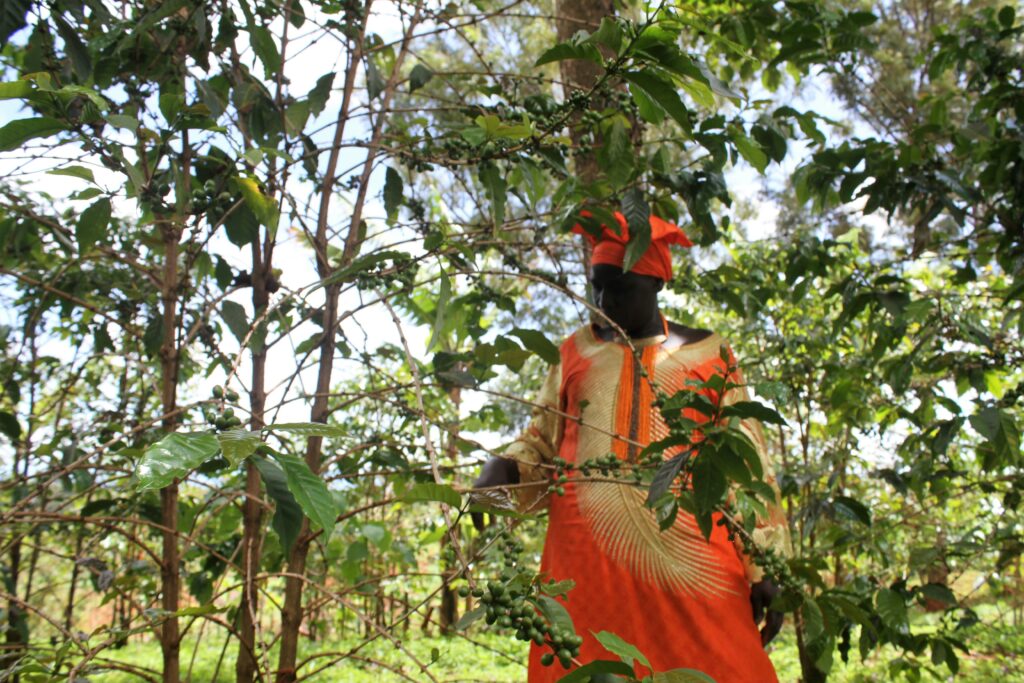By Javier Silas Omagor
Farmers in the eastern sub-region of Sebei are embracing agroforestry coffee farming, to combat climate change.
Agroforestry coffee farming is a sustainable land use practice that combines coffee cultivation with the planting of trees and other crops in the same plot of land.
“Since I started practicing Agroforestry coffee farming, I have realized improved production and quality yields,” William Toboswo a farmer in Kween said.
The 68-year-old coffee farmer has been able to educate his four children to university level using the proceeds from his farm.
“I used to run to the money lenders for school fees but not anymore and that is why I have trained so many other farmers in Kween district and entire Sebei because this is one stone for two birds,” he said.
Another farmer, Mirika Kissa a resident of Chebugag, Tegeres, West Division, Kapchorwa Municipality in Kapchorwa district explained how the other trees planted in her coffee farm bolster the soil health of her farm.
“With agroforestry coffee farming, the soil retention is assured and so is the prevention of its erosion,” Kissa revealed.
As a result, Kissa can now save money she previously used for buying soil fertilizers to boost her farm’s productivity.
“The leaves that shade off the trees decompose to form natural organic manure for my farm while improving the soil’s ability to deliver,” Kissa explained.
The model female farmer continued: “trees also provide shade for my coffee plants especially during dry seasons.”
Besides soil health and enhanced productivity, this approach can provide a range of benefits to combat climate change, some of which include Carbon sequestration. Water and biodiversity conservation and economic ones as well.
The practice also leads to carbon farming as interested companies have also started to show interest in buying carbon from some of these farmers’ farms.
Climate change experts such as Joseph Maberi of ‘From Climate Victims to Climate Heroes’ lauded the agroforestry coffee farming initiative in Sebei which he says will go a long way in contributing to the climate change fight.
Particularly, Maberi singled out the carbon farming linkage as the central factor offered by the initiative.
“The farmers have chosen the right path of championing community driven efforts to combat effects of climate change and this agroforestry practice is very affordable,” Maberi reasoned.
Maberi, who also works at the project dubbed “From Climate Change victim to Climate Change heroes,” urged farmers across the country to emulate the Sebei farmers.
Since specific trees are recommended, Maberi advised farmers to always consult on the right tree species to intercrop with their coffee trees.
Some of the trees being used include cardia African ficus natellensis, ficus sur and maesopsis eminni among others.
To facilitate Sebei farmers’ knowledge through capacity building initiatives, a couple of like-minded farmers have since teamed up to support these farmers.

They include the Spanish founded non-profit organization Solidaridad, the Netherlands’ farm established Rabobank, Water and Environment Journalist Network, Uganda in partnership with the government.
Margret Muiebelt, the Rabobank account’s manager partnership team Africa commended the farmers and disclosed that the arrangement would soon start carbon harvesting would soon yield even bigger economic benefits for the farmers.
“Besides the contribution towards combating climate change and primary economic benefits, our farmers will be able to sell carbon companies are willing to come and buy this carbon,” can play an important role in combating climate change by sequestering carbon, improving soil health and biodiversity, conserving water, and providing economic benefits to farmers.
Robert Nangasha, the Extension Services Manager at Uganda Coffee Development Authority (UCDA) is confident that the initiative will boost the government’s dedicated fight against climate change.
“Through different climate change adaptation interventions, we should all work collectively to ensure that we mitigate climate change risks,” Nangasha tipped.
According to Nangasha, the government is interested in supporting such locally driven ideas.
What is carbon farming? Carbon farming is a set of land management practices that aim to increase the amount of carbon that is stored in the soil, vegetation, and other natural systems, while also reducing greenhouse gas emissions.
This approach can provide a range of benefits to communities such as Sebei where it is currently widely practiced, including:
Climate change mitigation: Carbon farming can help to reduce greenhouse gas emissions and slow down the pace of climate change.
Resilience to extreme weather events: Carbon farming can help to build resilience to extreme weather events such as droughts and floods.
By increasing soil organic matter, it can improve the soil’s ability to retain water, reducing the impacts of drought.
Similarly, by improving soil structure and infiltration, it can reduce runoff and flooding.
Improved water quality: Carbon farming practices can also help to improve water quality by reducing nutrient runoff and erosion. This can benefit both human health and aquatic ecosystems.
Overall, carbon farming has the potential to provide a wide range of benefits to communities, making it a valuable approach to land management in the context of climate change.





